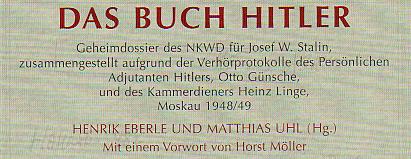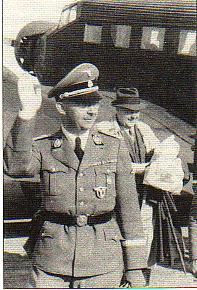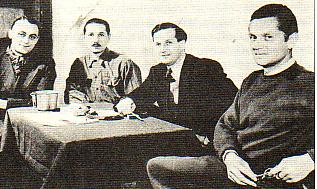The reason why the Hess/Hitler overture to England was ignored by Churchill et al is because they knew
of potential much better deals that included the replacement of
Hitler. With the knowledge of Hitler’s spy chief who was in constant contact
with London since 1938 two attemps where made to
murder Hitler. And by the summer of 1942-if not before, in December 1941, when
the United States entered the War Heinrich Himmler was convinced that Germany
would lose, and begun searching for ways to ingratiate himself with the Western
Allies, using the SS and the Nazi Party security apparatus as bargaining chips.In fact in 1941 British intelligence had been passed
off fake ‘Nazi documents’ to the US President, which he used to persuade
Congress to bring America ever closer to direct engagement. Although it gives
me no pleasure to revisit legends such as Stalin, Hitler, Churchill and
Roosevelt.
Social Science Discovers: Heinrich Himmler's High
Treason Rendezvous at Zhitomir
Convinced since early
1942 that Germany would lose the War, in August 1942 Himmler proceeded to
Zhitomir where he explained the head of the "Sicherheitsdienst"
Schellenberg, how to unseat Hitler in a putsch that would be followed by a secret
deal for a negotiated peace with the Western Allies in exchange for license to
continue Germany's war with the Soviet Union.
|
|
|
|
Schellenberg (far right),
a witness at the Nuremberg war crimes trials, sits with former subordinates
in the Sicherheitsdienst-foreign intelligence-including Wilhelm Hoettl (on his right), who handled Balkan intelligence
for Schellenberg.
|
|
In Germany, Hitler's
reaction to Hess's flight was largely motivated by fear of losing face before
his own people should they discover that their Führer, whilst exhorting them to
fight on in his war of conquest, had actually been secretly involved in
negotiations with certain top Britons to make peace and end the war. Indeed, he
had even offered to at some point to withdraw all German forces from occupied
Western Europe in order to attain a deal.
Aus der Akte Nr. 462a im Bestand 5 Verzeichnis 30 im Russischen
Staatsarchiv für Zeitgeschichte, Moskau. (English text
continues underneath)
„Aus Hitlers Umgebung sickerte durch, dass die
Entscheidung, Heß für geistesgestört zu erklären, in Hitlers Besprechung mit
Göring, Ribbentrop und Bormann gefallen war.
Als aus London die Meldung kam, der Duke of
Hamilton bestreite, mit Heß bekannt zu sein, entfuhr es Hitler spontan: »Was
für eine Heuchelei! Jetzt will er ihn nicht einmal kennen!«
Bei den Gesprächen in Hitlers Stab über den Flug von Heß wurde
unter dem Siegel der Verschwiegenheit geäußert, dass dieser ein Memorandum über
die Friedensbedingungen mit England bei sich habe: Heß hätte es aufgesetzt und
Hitler zugestimmt.
Dessen Hauptpunkt sei gewesen, dass England Deutschland freie
Hand gegenüber Sowjetrussland lassen werde, während Deutschland England den
Erhalt seines Kolonialbesitzes und die Vorherrschaft im Mittelmeerraum
garantiere.
Außerdem würde in dem Memorandum herausgestellt, dass ein
Bündnis »der großen Kontinentalmacht Deutschland« mit der »großen Seemacht
England« ihnen die Herrschaft über die ganze Welt sichern werde. Zudem wurde
bekannt, dass Heß seit dem Februar 1941 intensiv- mit der Ausarbeitung der
politischen und wirtschaftlichen Vorschläge befasst gewesen sei, die die
Grundlage der Verhandlungen mit den Engländern bilden sollten. Daran waren
weiter beteiligt: der Chef der Auslandsorganisation der nationalsozialistischen
Partei Bohle, der Ministerialrat im Reichswirtschaftsministerium Jagwitz, General Karl Haushofer und Heß' Bruder Alfred, Bohles Stellvertreter. P. 145 from:

The extraordinary
truth is that, for sixty years, a potentially devastating political secret has
been covered up by subterfuge. This secret was related to British fears in 1940
and 1941 that the country might go down to crushing defeat, and to how Britain's
top political minds determined that Britain would survive. The means they used
to accomplish this were ingenious and extremely subtle, but also unscrupulous.
They were the acts of desperate men, faced with the options of either
catastrophic defeat or national survival.
By its very nature,
what was done became a secret that could never be revealed. The decision to
promulgate the legend of the standalone nation - that Britain had survived
through pure military endeavour and luck - meant that
disclosure during the dangerous years of the Cold War would have resulted in
the shattering of Britain's international credibility, and the ruin of many
political careers.
Yet it could also be
said that there was another, more noble, purpose to keeping this secret for all
time. The impression has always been maintained that the Nazi leaders were a
bizarre range of individuals, devoid of compassion for humanity - and, in many
cases, evil personified. If, however, the truth should turn out to be that some
of these men had considerable political acumen, but that the inexorable spread
of the Second World War resulted largely from their inability to control the
situation, the distinction between pernicious men of evil intent, and
politicians unable to control the flames of war they had themselves lit,
becomes less clear-cut.
As early as January
1936, shortly after succeeding to the throne, King Edward VIII had sent word to
Hitler via a German kinsman, Carl Eduard, Duke of Saxe-Coburg-Gotha, to say
that he believed an alliance between Great Britain and Germany was politically
necessary and that it could even lead to a military pact including France. It
was therefore his wish, King Edward said, to speak personally to the Reich
Chancellor as soon as possible, either in Britain or Germany.
Hitler thus saw
Edward's abdication as a victory for those forces in Britain that were hostile
to Germany. Joachim von Ribbentrop, the German ambassador in London, confirmed
Hitler's view that `the King had been deposed as the result of a
“Jewish-Masonic conspiracy” (the traditional view of the Nazi’s overall,
see: Hitler’s Secret Protocols.)
After Edward's
abdication One of the first big projects the Windsors undertook in 1937 was a
trip to National Socialist Germany. Now would come the meeting that Edward had
wished for: as Duke of Windsor he visited Adolf Hitler, Chancellor of the
German Reich, albeit not in Berlin, but at his private residence, the Berghof,
near Berchtesgaden in Bavaria.
There have never been
any British disclosures of the details of what the Duke of Windsor was
negotiating with Hitler and later the German government when he was working for
the British Foreign Office in Portugal. The only clues to have surfaced allude
to a seven-point plan, which was of sufficient importance for Hess secretly to
meet the Duke in the privacy of the Sacramento a Lapa home of the German
Ambassador to Portugal, Hoyningen-Huene, on Sunday,
28 July 1940, for a series of secret meetings. Unfortunately, the Duke was
spotted by expatriates living nearby.
And on 1 August the
Duke, under increasing pressure from the London, departed for the faraway
Bahamas. His endeavours to negotiate a peaceable
accord proceeded not one jot further, for the British government refused to
countenance any more interference from the man who had caused such
constitutional turmoil less than four years before. Also, unbeknownst to the
Duke of Windsor, peace with Germany was the last thing on Winston Churchill's
mind.
The next (some say it
was the fourth) peace offer would emanate directly from Hitler himself, and it
would be so secret that the Führer told no one in Germany about it at all, not
in the diplomatic service, the government, or the party; not even his inner
circle.
This latest attempt
to open peace discussions caused considerable consternation in Whitehall. The
very few men in the British Foreign Office who knew about it feared that the
more impressive these peaceable attempts became, the greater the likelihood that
they might dent Lord Halifax's determination to stand by Churchill and his `no
surrender' policy, and the resolve of those in the government who might be
tempted to accept a quick fix today, and worry about a Europe dominated by Nazi
Germany tomorrow. There was concern that the British government might split
between those determined to defeat Germany, and those who might vote against
Churchill in the House of Commons for peace, to save Britain from any further
suffering. This new initiative came at the height of the Blitz, those crucial
weeks of the Battle for Britain, which made the situation all the more
worrying.
Hitler's offer on
this occasion indicated that he was now approaching peace from a geopolitical,
rather than military, point of view, revealing the continuing influence of his
long discussions with Karl Haushofer in the 1920s and thirties. It also perhaps
indicates that the intellect and the foreign affairs interests of Rudolf Hess
lay behind the offer now being proposed to the British Ambassador in Stockholm,
Victor Mallet, via Swedish High Court Justice Dr Ekeberg, duly reported back to
London that:
Hitler's peace
terms as follows:
1 The Empire remains
with all the colonies and mandates.
2 The continental supremacy of Germany will not be called into question.
3 All questions concerning the Mediterranean and the French, Belgian and Dutch
colonies are open to discussion.
4 Poland. There must be `a Polish State'.
5 Czechoslovakia must belong to Germany.
But, that Hitler
wished to re-establish the sovereignty of all the occupied countries 'auf die dauer' [i.e. later on, on a permanent basis]. In the
economic sphere, however, the occupied countries must be part of the European
continent, but with complete political liberty (Doc. No. FO 371/24408 - Public
Records Office, Kew, England).
Seen in context, by
the summer of 1940 Germany had conquered Poland, Norway, Denmark, Luxembourg,
Holland, Belgium and France. The British Army had been defeated and only just
escaped from Dunkirk, the Battle of Britain was raging in the skies over London
and the Home Counties, and Britain's cities were suffering a ferocious blitz
both night and day. Vansittart's letter to Lord Halifax makes it clear
that Whitehall and especially Churchill, had viewed Germany - and not
particularly Nazism - as a threat ever since WWI (Doc. No. FO 837/593 - Public
Records Office, Kew). This emanated from the German policy of 'Drang nach Osten', which came with the fall of the Ottoman
Empire, when General von Moltke and later the Kaiser became convinced that
Germany could fill the resultant power-vacuum.
For updates
click homepage here

